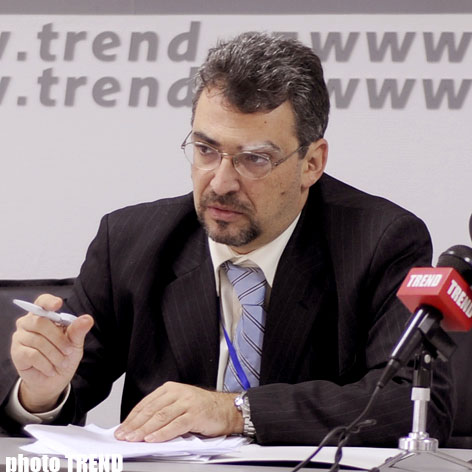Azerbaijan, Baku, Nov. 8 / Trend /
The Azerbaijan-Georgia-Romanian Interconnector (AGRI) project, which envisages making Azerbaijani liquefied gas supply through Georgia and the Black Sea to Romania, might become one of the most promising gas supply routes from the Caspian region to Europe, The Heritage Foundation's leading expert on Eurasia and Trend Expert Council member Ariel Cohen said today.
"Today, the AGRI can become one of the most promising routes for gas supply from the Caspian region to Europe," he said in an interview with the Caucasus Times. "Obviously, this project will be implemented faster than the Nabucco gas pipeline project, which is a priority for Europe."
Azerbaijan, Georgia, Romania and Hungary signed the Baku Declaration on the AGRI Project in Baku on Sept. 14.
Cohen added that Azerbaijani President Ilham Aliyev, Georgian President Mikheil Saakashvili, Romanian President Traian Basescu, and Hungarian Prime Minister Viktor Orban gave a new impetus to the project in Baku, as the three presidents count on liquefied natural gas.
"The high level of attention to the project gives cause to think that the new idea will soon attract other states," Cohen said.
He said by signing the declaration to start working on the AGRI project, Europe has received some guarantee of energy security. At present, many experts believe that the AGRI is the best decision to achieve EU energy security. It is also worth noting that Turkmenistan also intends to supply natural gas across the Caspian Sea through Azerbaijan to Europe.
Cohen also recalled that Ukrainian Fuel and Energy Minister Yuriy Boyko voiced an interest in the AGRI project and expressed his country's willingness to buy 10 billion cubic meters of Azerbaijani liquefied natural gas annually after the construction of a liquified natural gas terminal in Odessa. According to Cohen, Ukraine's readiness to participate in the AGRI project and the terminal construction sends an unambiguous signal to Gazprom that Kiev has an alternative choice.
"In the future, the AGRI can become Ukraine's trump card in talks with Gazprom on gas prices," Cohen stressed.
According to the expert, after the AGRI project starts operating, Azerbaijani energy resources will enter the European market, especially Central and Eastern Europe and the Balkans. And in the long-term perspective, he said, after the appearance of a single European gas network, Baku will have access to assets in Western Europe that will be a significant geopolitical achievement for Azerbaijan and its partners in this project.
Three capacity volumes are being considered for the project - 2 billion cubic meters of gas, 5 billion cubic meters and 8 billion cubic meters per year. According to preliminary data, the cost varies from 1.2 billion to 4.5 billion euro depending on capacity, Azerbaijani Industry and Energy Minister Natig Aliyev said earlier.
The project to supply Azerbaijani liquefied natural gas to Romania envisages the construction of two terminals for liquefied natural gas - one in Georgia and the other in Romania. According to preliminary data, the project will cost 4.6 billion euro. The project envisages transporting Azerbaijani gas via pipelines to the Black Sea coast of Georgia, where the gas will be liquefied at a special terminal. The gas will then be delivered to a terminal at the Romanian port of Constanta via tankers.






